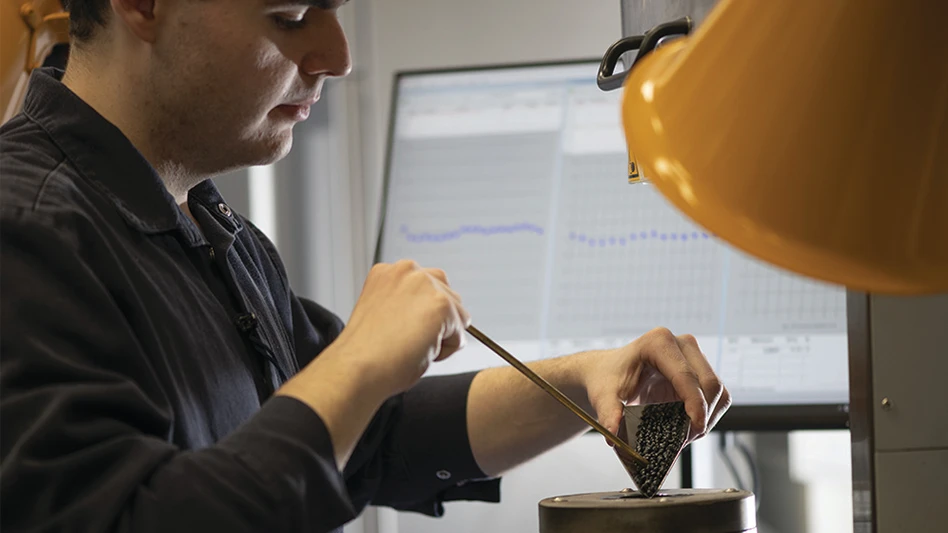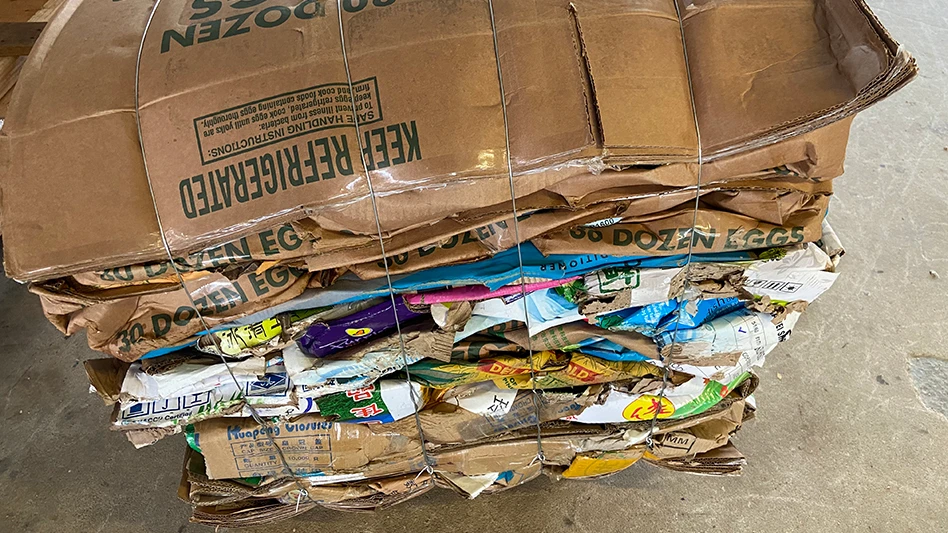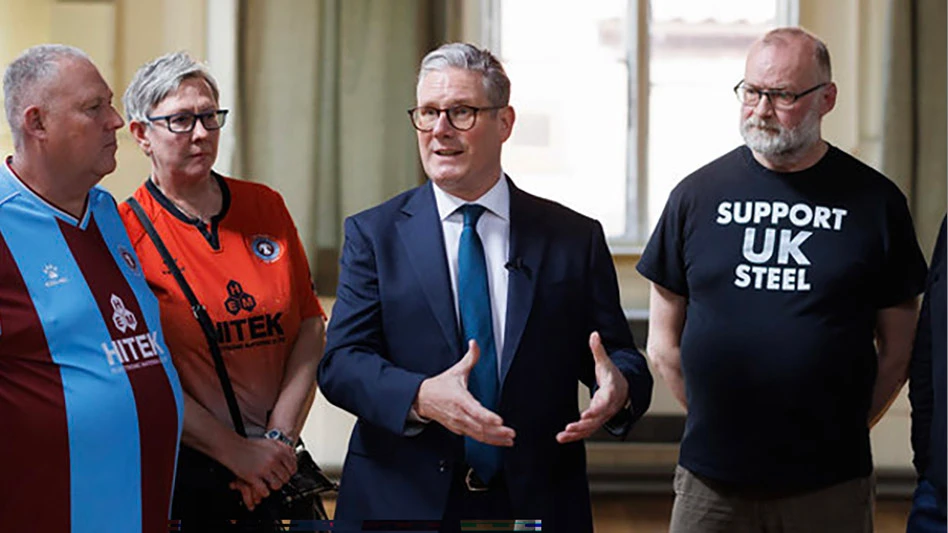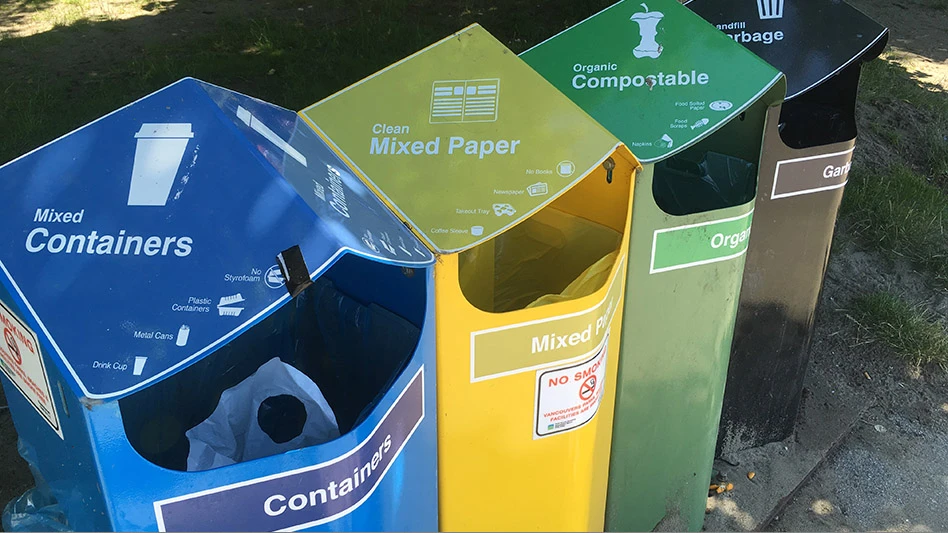MRFF collaboration releases study results

Materials Recovery for the Future (MRFF), www.materialsrecoveryforthefuture.com, a research collaboration with the goal to improve recycling of flexible packaging, says its tests have shown that automated sorting technologies currently being used in material recovery facilities (MRFs) can capture flexible plastic packaging, “potentially creating a new stream of recovered materials while improving the quality of other recycling streams.”
The research is presented in a report from Ann Arbor, Michigan-based Resource Recycling Systems (RRS) titled “Flexible Packaging Sortation at Materials Recovery Facilities,” available at http://bit.ly/2cwDxVw.
MRFF collaborators say the report demonstrates that with adequate screening and optical sorting capacity, flexible plastic packaging can be captured efficiently in single-stream MRFs.
Common forms of flexible plastic packaging include snack bags, resealable food bags, laundry detergent pod pouches and pet food bags.
“Flexible packaging has many positive attributes—highly efficient, great product protection and low environmental impact,” says Brad Rodgers, foods packaging research and development director for discovery and sustainability at PepsiCo, Purchase, New York. “However, recovery has been one of its weak points. This study is shedding light on pathways that can be deployed to improve flexible packaging end-of-life options.”
PepsiCo, along with several other corporations and industry trade groups, is participating in MRFF. The collaboration brings together brand owners, manufacturers and packaging industry organizations that say they are committed to enhancing recovery solutions for flexible plastic packaging.
Larry Baner, senior packaging research scientist of global packaging and design for Nestlé Purina PetCare, St. Louis, says, “Although there is still a lot of work to be done to define the best way to separate flexibles from single-stream recyclables, this research moves us closer to solutions.”
This initial phase of the research included baseline testing, equipment testing and a series of MRF trials. RRS says it developed the test methodology and conducted the trials.
The research finds that existing optical sorting and MRF technology can be used to sort flexible plastic packaging at promising levels of efficiency. With some targeted equipment adjustments, identification and sorting of the seeded flexible plastic packaging improved dramatically.
Although the film quality levels generated were not optimal, it is expected that the technology can be optimized so fiber product quality is concurrently improved, RRS says.
Subsequent research will focus on further refinements to sorting technology, economic feasibility, assessing end markets for the material and developing a recovery facility demonstration project.
Pilot program seeks to increase automotive recycling

SPI: The Plastics Industry Trade Association, Washington, has introduced the Automotive End-of-Life Vehicles (ELV) Recycling Demonstration Project. SPI is partnering with the Automotive Recyclers Association (ARA), Manassas, Virginia; Automotive Recyclers of Canada (ARC), London, Ontario; Canadian Plastics Industry Association (CPIA), Mississauga, Ontario; and a number of independent plastics and automotive recyclers.
The project’s goals are to develop a technically and economically feasible method to collect and recover polypropylene (PP) and thermoplastic olefin (TPO) auto parts and to gather data to better guide design for recycling.
The partners will share project data and management practices with the auto and plastic recycling industries. The goal is to predict demand trends for recycled materials so recyclers can invest more confidently in processing capacity.
Closed Loop Foundation awards grants to two plastic film recyclers

The Closed Loop Foundation has awarded innovation grants to two companies that it says have developed methods to solve the challenges of plastic film recycling.
The Closed Loop Foundation is a partnership between the nonprofit Closed Loop Fund and the multinational consumer products company SC Johnson.
The recipients of the awards are Zzyzx, a Pennsylvania-based company that makes recycled plastic pellets from varying plastic waste streams, and Drought Diet Products, a California-based company that will use postconsumer plastic film in its irrigation piping products.
According to the foundation, both companies are examples of ways to drive end market value for postconsumer recycled plastic film. Zzyzx is expected to be able to process 7 million pounds of film per year per machine. Drought Diet Products estimates that it could consume 1.4 billion pounds of plastic film annually.
“We are invested in building the future of recycling and making sure that all of our products are recyclable,” says Kelly Semrau, senior vice president, global corporate affairs, communication and sustainability at SC Johnson. “These two companies help build value in recycled Ziploc bags and other film plastics. We need to build strong end markets in order to see innovation in how this material is collected and recycled.”
Zzyzx CEO Michael Janse says, “This grant will help us purchase the equipment needed to scale up our technology for testing in a plastic processing facility and will act as a stepping stone to large-scale recycling operations.”
Drought Diet Products says it will use the grant money to integrate postconsumer low-density polyethylene feedstock into its manufacturing operations.
North Carolina county joins WRAP campaign
The Flexible Film Recycling Group (FFRG) of the American Chemistry Council (ACC), Washington, has joined officials from Mecklenburg County, North Carolina, and Charlotte to introduce a campaign designed to increase recycling of plastic wraps and bags throughout the county. The campaign is part of WRAP (Wrap Recycling Action Program).
Nationwide, more than 18,000 grocery and retail stores collect flexible plastic wraps and bags (also known as film) for recycling—yet consumer awareness remains low, the ACC says.
A recent survey of Mecklenburg County residents found that only half are aware that certain plastic items should be brought to grocery or retail stores to ensure proper recycling. In addition, few residents are aware of the many types of plastic wraps and bags that can be recycled. ACC says the Mecklenburg County campaign is designed to change that.
At the kickoff event at the Harris Teeter store in the Ballantyne Commons East shopping center, local officials pointed out that although plastic wraps and bags are widely collected for recycling at many grocery and retail stores throughout the county, residents should not place these materials in curbside recycling bins because they can cause significant problems with machinery at the community recycling facility. Putting plastic bags or wraps in curbside bins makes recycling more difficult, time consuming and expensive, officials said.
Shari Jackson, director of film recycling for ACC, echoed these remarks at the event. “As you will hear time and again today, these plastic wraps and bags do not belong in your curbside recycling bins,” Jackson said. “Residents can simply gather their clean and dry plastic wraps and bags in a plastic shopping bag at home and then deposit that bag in a storefront recycling bin at participating Mecklenburg County grocery and retail stores.”
Mecklenburg County residents can learn where and what to recycle at www.RecycleTheWrap.com.
WRAP is a public-private partnership that includes the FFRG, GreenBlue/the Sustainable Packaging Coalition, the Association of Plastics Recyclers, brand companies, retailers, states, cities and others. The Mecklenburg County campaign is expected to serve as a model for other areas in North Carolina and eventually the entire state, ACC says.
GM expands its Do Your Part recycling program

General Motors (GM), headquartered in Detroit, has announced that it is adding 2 million water bottles from Flint, Michigan, residents to its Do Your Part water bottle recycling initiative. The company partnered with Michigan-based Schupan Recycling to collect and process the bottles.
The collected plastic is washed, flaked and turned into fleece for three different products: Chevrolet Equinox V-6 engine covers, insulation that is used in coats for the homeless made by Detroit’s The Empowerment Plan and air filters that are used at 10 GM plants.
“We’re committed to proving to employers that formerly homeless people can be a skilled talent pool,” says Veronika Scott, founder and CEO of The Empowerment Plan, which seeks to educate, employ and empower homeless individuals to create better lives for themselves and their families while producing a product for those in need. “The end product is more than a coat: It empowers women to take control of their lives and provides the path to long-term, sustainable jobs.”
GM is donating enough insulation for The Empowerment Plan’s seamstresses—formerly homeless women—to make 6,500 coats that transform into sleeping bags. Each coat contains 31 water bottles.
The GM supplier Filtration Services Group, headquartered in Waterford, Michigan, involved the N.E.W. Life Center in Flint to make air filter panels from the 9,000 square feet of fleece created since Do Your Part launched in April of 2016.
After at-risk individuals participate in programs dedicated to employment preparation or life change, the nonprofit training center employs them to further their skills.
An estimated 1.2 million bottles from five GM facilities throughout metro Detroit and Flint supplemented the 2 million bottles coming from the Flint community.
GM recently added its Romulus Powertrain plant to the Do Your Part program.
John Bradburn, GM global waste reduction manager, says, “The Do Your Part recycling initiative is a way our employees and communities can connect their individual actions to broader social and environmental causes.”
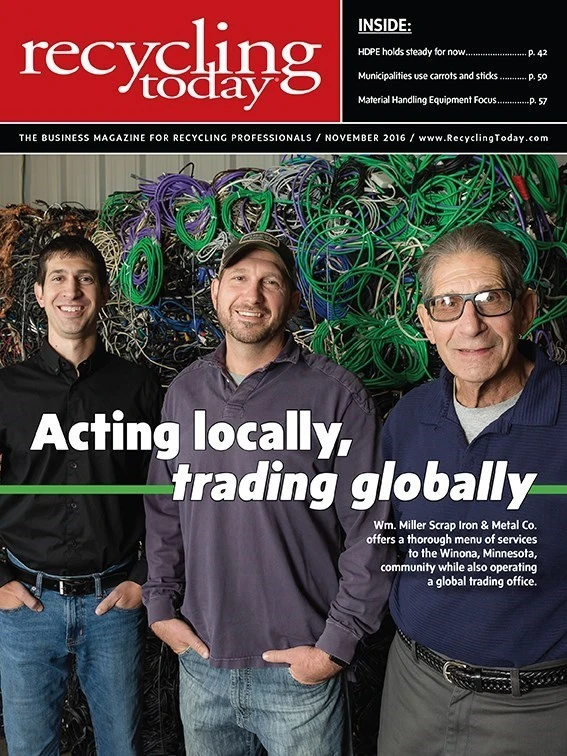
Explore the November 2016 Issue
Check out more from this issue and find your next story to read.
Latest from Recycling Today
- Commentary: How EPR is transforming the packaging industry
- Acerinox names new North American Stainless CEO
- Greenwave closes 2024 books with red ink
- Steel Dynamics nets $217M on record shipments
- Massive Chinese steelmaking rebound recorded in March
- LME looks into sustainable metal pricing
- OnePlanet Solar Recycling closes $7M seed financing round
- AMCS launches AMCS Platform Spring 2025 update


